|








| |
hardware
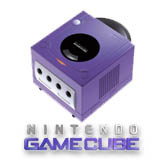
Nintendo GameCube
The hardware breakdown of Nintendo's next-generation console.
September 26, 2001 - Below, you will find the
full specs of Nintendo's GameCube system. If you're looking for detailed
information on the console be sure to check our
Launch Date: September 14, 2001, in Japan; November 18,
2001, in North America; and Spring 2002 in Europe.
Peripheral Devices: Memory Card, containing 4 megabits
of flash memory; SD-Memory Card Adapter; Wireless Wavebird; Controller;
56Kbps, V. 90, Modem Adapter; Broadband Adapter; and Digital Video Cable.
Controller: To provide more comprehensive and intuitive
play control, Nintendo has added several new features to the Nintendo GameCube
controller, including a second analog control stick, left and right analog
trigger buttons, and a built-in rumble motor. The Nintendo GameCube controller
has two grips and the controls for the left and right hands have been
separated into two "systems." The right-side buttons have been re-arranged
to allow the user to set the A Button home position, making the role of each
button more natural.

Nintendo GameCube hardware specifications:
|
MPU ("Micro Processing
Unit")
|
Custom IBM Power PC "Gekko"
|
|
Manufacturing Process
|
0.18 micron IBM Copper Wire Technology
|
|
Clock Frequency
|
485 MHz
|
|
CPU Capacity
|
1125 Dmips (Dhrystone 2.1)
|
|
Internal Data Precision
|
32-bit Integer & 64-bit Floating-point
|
|
External Bus
|
1.3 GB/second peak bandwidth
32-bit address space
64-bit data bus
162 MHz clock
|
|
Internal Cache
|
L1: Instruction 32KB, Data 32KB (8 way)
L2: 256KB (2 way)
|
|
|
|
|
System LSI
|
Custom ATI/Nintendo "Flipper"
|
|
Manufacturing Process
|
0.18 micron NEC Embedded DRAM Process
|
|
Clock Frequency
|
162 MHz
|
|
Embedded Frame Buffer
|
Approx. 2 MB
|
|
|
Sustainable Latency: 6.2ns (1T-SRAM)
|
|
Embedded Texture Cache
|
Approx. 1 MB
|
|
|
Sustainable Latency: 6.2 ns (1T-SRAM)
|
|
Texture Read Bandwidth
|
10.4 GB/second (Peak)
|
|
Main Memory Bandwidth
|
2.6 GB/second (Peak)
|
|
Pixel Depth
|
24-bit Color, 24-bit Z Buffer
|
|
Image Processing Functions
|
Fog, Subpixel Anti-aliasing, 8 Hardware Lights, Alpha Blending,
Virtual Texture Design, Multi-texturing, Bump Mapping, Environment
Mapping, MIP Mapping, Bilinear Filtering, Trilinear Filtering,
Ansitropic Filtering, Real-time Hardware Texture Decompression (S3TC)
Real-time Decompression of Display List, HW 3-line Deflickering filter
|
|
|
|
|
Audio Processing
|
(Incorporated into the System LSI)
|
|
Sound Processor
|
Custom Macronix 16-bit DSP
|
|
Instruction Memory
|
8KB RAM + 8KB ROM
|
|
Data Memory
|
8KB RAM + 4KB ROM
|
|
Clock Frequency
|
81 MHz
|
|
Performance
|
64 simultaneous channels, ADPCM & PCM encoding
|
|
Sampling Frequency
|
48KHz
|
|
Performance
|
|
|
Floating-point Arithmetic Capability
|
10.5 GFLOPS (Peak)
(MPU, Geometry Engine, HW Lighting Total)
|
|
Real-world polygon
|
6 to 12 million polygons/second (Peak)
(Assuming actual game conditions with complex models, fully
textured, fully lit, etc.)
|
|
|
|
|
System Memory "Splash"
|
40 MB
|
|
Main Memory
|
24 MB MoSys 1T-SRAM
Approximately 10ns Sustainable Latency
|
|
A-Memory
|
16 MB 81 MHz DRAM
|
|
|
|
|
Disc Drive
|
CAV (Constant Angular Velocity) System
|
|
Average Access Time
|
128ms
|
|
Data Transfer Speed
|
16Mbps to 25Mbps
|
|
Media
|
3-inch Nintendo GameCube Disc based on Matsushita's
Optical Disc Technology
|
|
Capacity
|
Approx. 1.5GB
|
|
|
|
|
Input/Output
|
4 Controller Ports
|
|
|
2 Memory Card Slots
|
|
|
Analog AV Output
|
|
|
Digital AV Output
|
|
|
2 High-Speed Serial Ports
|
|
|
High-speed Parallel Port
|
|
|
|
|
|
Power Supply
|
AC Adapter DC12V x 3.5A
|
|
|
|
|
Dimensions
|
4.3"(H) x 5.9"(W) x 6.3"(D)
|
Here's a look at Gamecube's storage medium, a smaller, proprietary DVD disk
that allows for 1.5 GB of data:

Gamester Bandit
March 25, 2002
All third-party controllers are created equally, but some are less
equal than others.
|
|

|
Type
|
|
Platform
|
|
Manufacturer
|
|
Availability
|
|
Features
|
|
InterAct SuperPad
|
October 18, 2001
InterAct has a more affordable alternative to the GameCube
controller.
|
|

|
Type
|
|
Platform
|
|
Manufacturer
|
|
Price
|
|
Availability
|
|
Features
|
|
MadCatz Cubicon
November 16, 2001
MadCatz gives GameCubers bigger grips, an extra shoulder button, and
a larger D-pad all for a more affordable price.
|
|
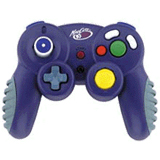
|
Type
|
|
Platform
|
|
Manufacturer
|
|
Price
|
|
Availability
|
|
Features
|
|
Nintendo Wavebird
Get the details on Nintendo's wireless Gamecube controller.
September 26, 2001 - Nintendo not only unveiled
the GameCube console and its standard controller at Spaceworld 2000, it also
gave audiences a glimpse at a wireless RF controller called the Wavebird. In
case you're wondering, the Wavebird name goes back to GameCube's codename:
Dolphin. Unlike the regular GameCube control pad, the Wavebird controller will
(at least initially) only be available separately -- and operates without the
need of a cable.
For the whole thing to work, players plug an RF receiver into one of the four
controller ports and set the controller to one of four channels. You can now
operate your GameCube from as far as 34 feet (10 meters) away. Sounds fishy,
doesn't it? Well, we've tested our fair share of wireless game controllers and
all of them were unreliable and badly made. But this is Nintendo we're talking
about -- and the Wavebird demonstration at Spaceworld was certainly convincing.
A Nintendo representative controlled Mario on screen without even pointing the
Wavebird at the GameCube.

Like with the standard controller, the controls are set up in what Nintendo
calls "systems." On the left you have the movement control with the
D-pad and analog stick, and on the right you have the A-centric button group.
In essence, the button layout is almost like a D-pad in its current formation.
You have the center, left, up, and right buttons with the center "A"
button acting as your home base. The control system is actually very
intuitive, as after you get a feel for the main buttons, the shoulder buttons
(L and R) are right at your fingertips. Although earlier controller designs
lacked a Z-Trigger, Nintendo added in a digital Z button on the top right side
of the controller above the R button after several developers requested it.
This is obviously there to allow the "Z-lock" camera mode for
instance while continuing to support both an R and L shoulder buttons. This
leaves the "C" camera stick for a variety of things. It may be
possible to use the Z-trigger to lock the camera on your enemy upon where you
may be able to freely swing the camera centered on your enemy.
Nintendo has only unveiled a Wavebird prototype so far, so the ugly plastic
color and oversized receiver are not indicative of the final look. As a matter
of fact, Nintendo hasn't unveiled many of the specifics as of yet. Apart from
price, it remains to be seen how much heavier the Wavebird will be since it
will most definitely need batteries to operate the built-in Rumble
functionality.
We will return with more specific data on the Wavebird as soon as we hear
something new.

|
Type
|
|
Platform
|
|
Manufacturer
|
|
Price
|
|
Availability
|
|
Features
|
|
|
add-on
Nintendo GameCube Broadband Adapter
September 26, 2001
Modem not fast enough? No problem -- here's its evil twin.
|
|

|
Type
|
|
Platform
|
|
Price
|
|
Availability
|
|
Features
|
|
Nintendo GameCube Modem Adapter
|
September 26, 2001
Take a look how Conexant's 56k modem fits into the Gamecube.
|
|

|
Type
|
|
Platform
|
|
Price
|
|
Availability
|
|
Features
|
|
cable
Nintendo GameCube Component Video Cables
September 26, 2001
The US standard for GameCube's digital video output. Also an
explanation of progressive scan benefits.
|
|
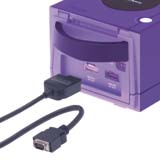
|
Type
|
|
Platform
|
|
Manufacturer
|
|
Price
|
|
Availability Date
|
|
Features
|
|
memory
InterAct Memory Card 16x
March 22, 2002
Finally a memory solution for GameCube that combines size with
unprecedented value.
|
|

|
Type
|
|
Platform
|
|
Manufacturer
|
|
Price
|
|
Features
|
|
Nintendo Memory Card 59
September 26, 2001
Get the lowdown on GameCube's version of the N64 Controller Pak.
|
|
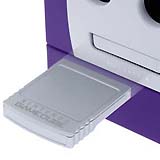
|
Type
|
|
Platform
|
|
Manufacturer
|
|
Price
|
|
Availability Date
|
|
Features
|
|
SD-Memory Card Adapter
September 26, 2001
An adapter which connects to high-density memory cards. Nintendo's
simple solution for future expandability.
|
|
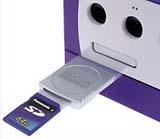
|
Type
|
|
Platform
|
|
Manufacturer
|
|
Price
|
|
Availability
|
|
Features
|
|
other
GameCube Receivers
December 11, 2001
We take a look at five DPLII-equipped receivers for the Nintendo
GameCube.
|
|

|
Type
|
|
Platform
|
|
Price
|
|
Features
|
|
peripheral
Cube JoyBox
November 13, 2001
Use a PS2/PSX controller with your GameCube including all the
benefits of analog and rumble.
|
|
|
Type
|
|
Platform
|
|
Price
|
|
Availability
|
|
Features
|
|

December 06, 2001
The ideal solution for GameCubers on the go. We review Interact's
handy Mobile Monitor peripheral.
|
|

|
Type
|
|
Platform
|
|
Manufacturer
|
|
Price
|
|
Availability
|
|
Features
|
|
Nyko Play Cube
February 19, 2002
It's not perfect, but for ten bucks you get to use your Dual Shock 2
with your GCN. What more do you want?
|
|

|
Type
|
|
Platform
|
|
Manufacturer
|
|
Price
|
|
Availability
|
|
Features
|
|
created by da biszy
|